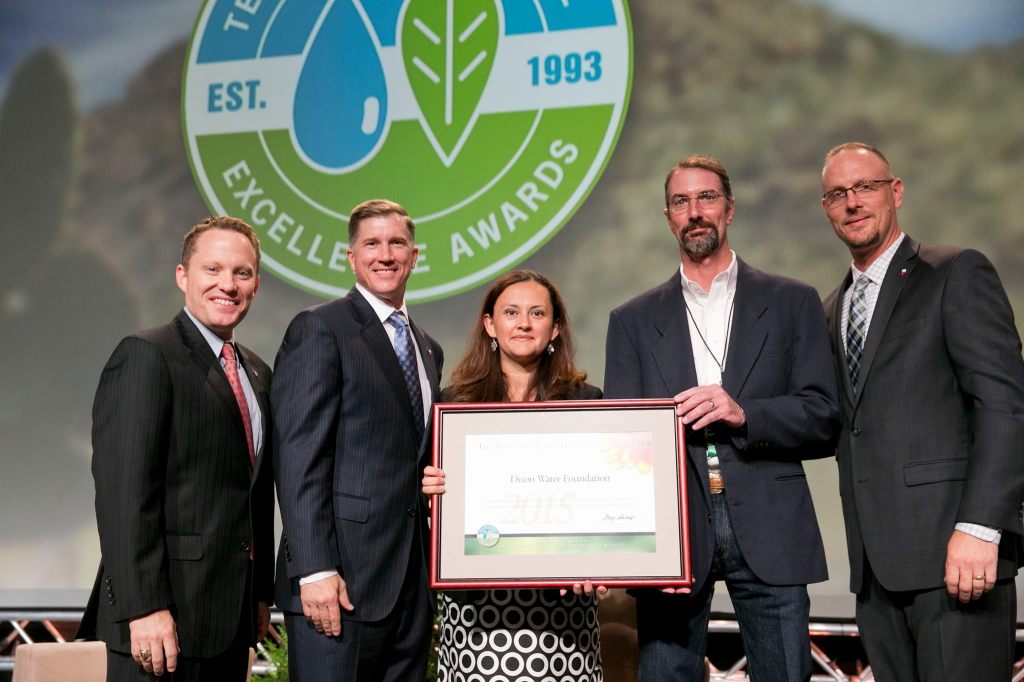A new PBS documentary, “The First Millimeter: Healing the Earth,” explains why the first millimeter of soil is critical to our collective future. Several Holistic Management practitioners from around the world share the practices they use to build healthy soils and vibrant communities.
NEWS & EVENTS
Hickory Creek Watershed workshop in Denton May 21
A Texas Riparian and Stream Ecosystem Workshop in the Hickory Creek Watershed will be held on May 21 in Denton. The training will focus on the nature and function of stream and riparian zones and the benefits and direct impacts from healthy riparian zones. This workshop is supported in part by a grant from the Dixon Water Foundation and is being co-hosted by the City of Denton and the Upper Trinity Conservation Trust. Learn more about this program and similar riparian workshops on the Texas Riparian Association’s website. RSVP required by May 15.
“Growing grass to save water” in Texas Tribune
Colin McDonald recently finished his Disappearing Rio Grande expedition, during which he spent seven months traveling 1,900 miles from the river’s headwaters to its mouth. Along the way, he documented the river’s condition, the lives of people who depend on it, and efforts to conserve it. One of his stops last fall was Dixon Ranches Mimms Unit, where he visited with President and CEO Robert Potts. To honor the end of the project, we wanted to share again the article McDonald wrote for the Texas Tribune about how our ranch is decreasing the amount of sediment and increasing flows in the Rio Grande.
Foundation honored at environmental awards
 The Dixon Water Foundation was honored with a Texas Environmental Excellence Award in Agriculture at the TCEQ’s Environmental Trade Fair and Conference in Austin last week. Ranch manager Casey Wade and board member Leslie Rauscher were on hand to accept the award. TCEQ produced this video about the foundation’s work for the ceremony:
The Dixon Water Foundation was honored with a Texas Environmental Excellence Award in Agriculture at the TCEQ’s Environmental Trade Fair and Conference in Austin last week. Ranch manager Casey Wade and board member Leslie Rauscher were on hand to accept the award. TCEQ produced this video about the foundation’s work for the ceremony:
Walt Davis on educating ranch managers
Walt Davis, a fifth-generation rancher and Dixon Water Foundation board member, was recently asked what should be included in a ranch management curriculum. The foundation supports sustainable ranching programs at Sul Ross State University and North Central Texas College, which are training a new generation land stewards who should understand the concepts Mr. Davis stated so well:
“The first bit of knowledge that I would suggest as critical to ranch managers is that all agriculture— ranching included—is a biological, rather than an industrial, process. The ranch most likely to be both profitable and sustainable will be the one that best mimics the complex web of relationships between soils, vegetation, grazers and predators that nature has used to create the productive and stable grassland communities that existed in various parts of the world prior to human intervention.
This program of natural management evolved over eons of time and is based in the fact that anything that is detrimental—in the long run—to any part of a functioning system is harmful to the entire system. It does not produce the most pounds per acre of animal life or the most pounds of grass, but rather a system that is highly resilient and effective in converting solar energy into biological energy over long periods of time.
The closer we can keep our management to this model, the more apt we are to build ranches that are ecologically, financially and sociologically sound. The major difference should be that humans assume the role of primary predator. This allows humans to benefit—take subsistence and create wealth—but it also means that we must take on the functions performed by predators: control numbers to suit conditions (set stocking rates); prevent abusive grazing (keep animals concentrated and moving); and maintain genetic fitness in the grazing animals by selection and culling.
A second concept of value would be the importance of biodiversity in improving the health of soils, plants, animals and bank accounts. Every type of organism has needs and the abilities to provide for those needs that are different from those of even its closest relatives. Having a broad range of healthy populations—made up of healthy individuals—of different kinds of organisms insures that no one species increases in number to pest status and that the resources of sunlight, water, mineral nutrients and space are fully utilized with none being over-utilized. Weeds and brush proliferate because the local environment is degraded and ecological niches are not being filled. Most weed and brush control methods make the situation worse by further simplifying the environment. We should manage for what we want; not against what we don’t want.
Stockmanship is a skill of vast importance that is woefully lacking on many ranches. We create most animal health problems by stressing the animals.
Finally, the importance of and the rationale behind planned, time-controlled grazing. This must include getting in sync with the realities of climate, vegetation, water, and the use of adapted animals. Basic to successful grazing management is an understanding of the relationships between grasslands and grazing animals and that proper grazing builds grassland health.
Many of the problems of ranching originated with the shift of emphasis from husbandry to science. We must use science to understand nature, but it is a mistake to attempt to use science to control nature. There is a severe shortage of people who understand that we must promote the health of the whole animal-plant-soil-human-wealth complex we call a ranch, in order to create profitable and sustainable operations.”
Walt Davis writes regular columns for the Farm Progress family of magazines and other publications. He has published two books: How to Not Go Broke Ranching and A Gathering At Oak Creek and has three others under way. You can learn more about his work at waltdavisranch.com.
Environmental excellence award in Alpine newspaper
A film crew visited Dixon Ranches Mimms Unit this week to shoot a video for the Texas Environmental Excellence Awards ceremony in May, during which the foundation will receive one of the prestigious TCEQ awards for agriculture. Alpine Avalanche reporter Jim Street joined the crew and penned this article about the foundation.
Land-use change in the Trans-Pecos
Texas’s water supply depends heavily on the stewardship of private agricultural land, which is increasingly being fragmented and developed. Learn more about changing land use in the Trans-Pecos and tools for private lands conservation at an upcoming seminar, “Going, Going, Gone!” on April 30th in Alpine. To learn more and register, visit the Texas Agricultural Land Trust website.
Josey Pavilion featured in Texas Architect magazine
“There is a difference between appreciating nature and respecting nature. The Living Building Challenge and Josey Pavilion do both,” says Corey Squire in a new feature on the Josey Pavilion in Texas Architect this month.
Also this month the pavilion was selected as a finalist in the Architizer A+ Architecture Awards.
Gainesville Daily Register features foundation’s TEEA award
The Dixon Water Foundation’s Texas Environmental Excellence Award was featured in the Gainesville Daily Register.
“We’re deeply honored to be recognized by TCEQ and the governor’s office,” said Robert Potts, the foundation’s president and CEO in the article by Kit Chase. “We are thankful for all of the hard-working people and collaborative partnerships that make our ranches, as well as our grant and education programs, successful. And we hope this recognition sparks more interest in the sustainable grazing practices we demonstrate on our land.”
Foundation receives Texas’s highest environmental honor
The Texas Commission on Environmental Quality this week honored the Dixon Water Foundation with a Texas Environmental Excellence Award in Agriculture, the highest environmental honor in the state. These prestigious awards bring attention to the most innovative and effective projects that strive to protect the state’s natural resources.
“With a patient and consistent dedication to holistic land management, the Dixon Water Foundation is assuring the most free and open lands in the state can remain healthy and productive for future generations,” says TCEQ’s announcement. Read more about the foundation’s award on the TEEA website or in this article by the Gainesville Daily Register.


